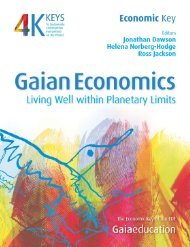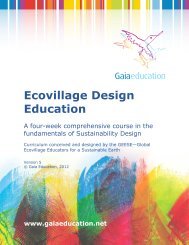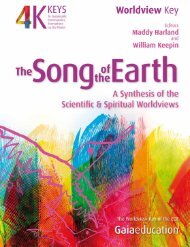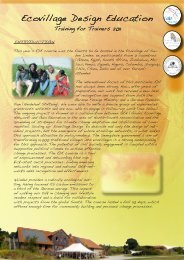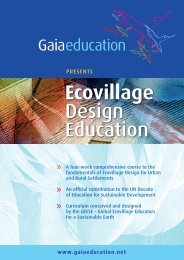Designing Ecological Habitats - Gaia Education
Designing Ecological Habitats - Gaia Education
Designing Ecological Habitats - Gaia Education
You also want an ePaper? Increase the reach of your titles
YUMPU automatically turns print PDFs into web optimized ePapers that Google loves.
50 <strong>Designing</strong> ecological <strong>Habitats</strong><br />
Its judgments are not alien to the scientific hypotheses of Jahn and Dunne<br />
that “consciousness… can marginally influence its physical reality to a<br />
degree dependent on its subjective resonance with the system or process<br />
in question” or that symbol systems may even neurognostically ‘true’ our<br />
experience (i.e. the brain may be wired for holistic experience) and teach us<br />
“to perceive everyday objects, events and states of affairs as instantiations<br />
of the totality”. 7<br />
In the symbolism of the Yijing, the all-connected life of the universe<br />
presences right here and now; it is not only a matter of remote eons and lightyears.<br />
And its authenticity coexists in cultural creations expressed within us.<br />
In every concrete situation of life, guan imparts and receives the “‘presencing<br />
of Being’ which is the Way of [sustaining and sustainable] Transformation”. 8<br />
Analogously, suggests Berry, the universe as the Great Self is fulfilled<br />
in the individual self, the individual self is fulfilled in the Great Self; and<br />
the universe can only be explained in terms of celebration. Disconnection<br />
from the re-source-fullness of a contemporary guan is a primary factor in our<br />
unsustainable ecosocial deracination.<br />
A fruitfully ecosocial story sustains a symphony of life systems and of<br />
diverse kinds of consciousness. This ‘ecology of mind’, rather than fixation<br />
on the single aim of ego-benefit, sounds the narrative calling of our time.<br />
We are invited by guan to outgrow the fragmentation of our interests and<br />
reinvent (eco)humanity as a mode of the ongoing transformation-wholing –<br />
not as a fragmented particle of a single-ordered whole, but as a participating<br />
member and a ‘focusing’ of an open ‘fielding’ of emerging Earth-human<br />
relations.<br />
Ecohumane relationships for themselves and not as tools to externalized<br />
ends (wealth, status, domination) least impose on their environment. Guaning<br />
as members of life systems, we are more inclined to respect and sustainingly<br />
care for those systems as well as for ourselves and the young in education,<br />
right livelihood and celebration. Wuwei (unforced, nonacquisitive) conduct<br />
moderating dysfunctional environmental abuse is simultaneously imparting<br />
and receiving the wholing-event (taiji) in resonant, mutually beneficial guan<br />
attunement. Contemplative guan restores in Earth-human relations the religio,<br />
re-membrance, and reciprocity (shu) between ourselves and the natural<br />
cosmic order.<br />
Guan allows us to experience all beings in analogia entis, i.e. as self-similar<br />
fractals of the field of Heaven, Earth and Humanity, or as embodiments of<br />
the potentials of the all-connecting quantum field. Developing his narrative<br />
of the cosmic “holomovement” wherein “everything is enfolded into<br />
everything”, the physicist David Bohm analogously proposes that scientific<br />
research should be complemented by meditative practice relevant to the<br />
‘undivided wholeness’ disclosed by contemporary as well as ancient research.<br />
This, others call a ‘mature contemplative’ orientation in the participationobservation<br />
of nature. Identifying guan as a meditative and contemplative<br />
method, Cheng echoes contemporary quantum physics in describing guan’s<br />
benefit in allowing us to maintain the link and identification with the ultimate



